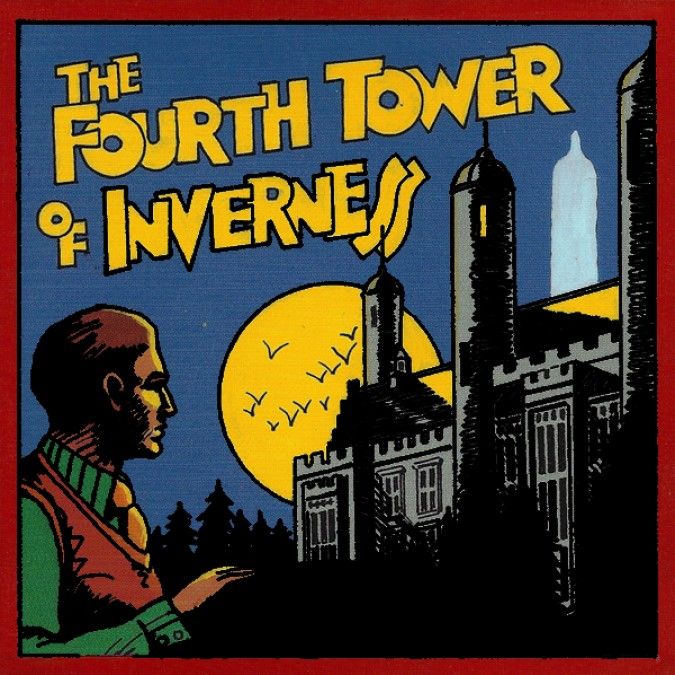Concomitant with the rise of television here in the United States was the decline of what we now call radio or audio theatre. However, it never really went away. To be sure, it never regained the mass popularity in enjoyed in the 1930s and '40s, but there have always been people who've kept it alive because they loved the medium. One such person is Meatball Fulton, a.k.a. Thomas Lopez. Fulton has been delighting the ears of listeners for over 30 years, beginning with The Fourth Tower of Inverness.
Prior to starting a career in audio theatre, Fulton worked in radio as a DJ and writer & performer of commercials. In 1970 he was working for CKGM in Montreal where the station's owner had an old farm called Inverness which he turned into a communal spot for station staff to hang out at and relax. It was here, with the farm's denizens in mind, that Fulton scripted his first audio drama.
The Fourth Tower of Inverness concerns Jack Flanders, named after Jack Packard of the old radio show I Love a Mystery, who is invited to the titular estate by his aunt, Lady Jowls. As Jack approaches, he sees the large mansion with its four towers come into view. Upon arrival, he is greeted by his aunt who informs him that Inverness has but three towers. In addition to the Brigadoon-like fourth tower, Jack also learns that a series of accidents plagues the estate. Even more mysterious is that they are all preceded by the strains of a song emanating from a jukebox in one of the towers, another homage to I Love a Mystery.
Lady Jowls' husband, Sir Henry, disappeared many years ago, but she has surrounded herself at Inverness with several strange characters who keep her company. Among them are Dr. Mazoola, an alchemist formulating dragon flypaper, i.e., flypaper to catch dragons; Little Frieda, a cigar-smoking Venusian with the appearance of a little girl and eyes that lack pupils; and the Madonna Vampira who lives in the hollow walls of the mansion, occasionally coming out to feed on the life energy of single men.
Jack embarks on a quest to discover the jukebox which presages the accidents and eventually finds himself being groomed for a quest to gain entrance to the fourth tower. Early on, his investigation leads to the Whirlitzer of Wisdom, a jukebox which, instead of songs, dispenses the wisdom of real-life spiritual teachers such as Baba Ram Dass. From this point onwards, the metaphysics which had previously come in bits and pieces, is now heaped onto the listener in more liberal doses. For instance, selections from the Whirlitzer of Wisdom begin to punctuate the story without having any diagetic sources. In one scene, Lady Jowls gives Jack her lengthy exegesis on the Tibetan Wheel of Life, which is positively interminable. As the tale really begins to progress, the listener finds herself being brow beaten with Eastern mysticism.
Despite these painful hangovers from the Age of Aquarius, The Fourth Tower of Inverness is not with its moments. Fulton constructs some extremely effective soundscapes, such as when Jack first encounters the Madonna Vampira. Her sensuous voice pulls Jack in to the accompaniment of some lovely runs on a piano that serve to heighten the scene's mood perfectly. It is a beautiful, dreamy idyll that lures the listener into the story just as the Madonna Vampira draws Jack into her clutches.
It's a shame that there aren't more scenes like this one, because the heavy-handed spiritualism often times obscures what should have been the story's strong point -- the characters. They are charming and funny, but most of them get lost in the shuffle as Jack moves from lesson to lesson in Buddhism or Sufism. All too often they lecture our hero or simply rattle off enigmatic sayings. Considering that The Fourth Tower of Inverness is a tale of spiritual discovery that clocks in at over seven hours, and in light of the revelation at its conclusion, precious little time is given over to Jack getting to know the inhabitants of Inverness. They may give him clues about the fourth tower, but they're really just stepping stones, which means that his relationships with them in and of themselves are devoid of any kind of spiritual significance.
Although The Fourth Tower of Inverness has several truly wonderful moments which showcase audio theatre at its best, it ultimately left me wanting to hear less about how false my corporeal existence is and more about the splendid and intriguing characters which Fulton created but let linger undeveloped.
(This was originally published at The Green Man Review back in 2003-08.)

No comments:
Post a Comment